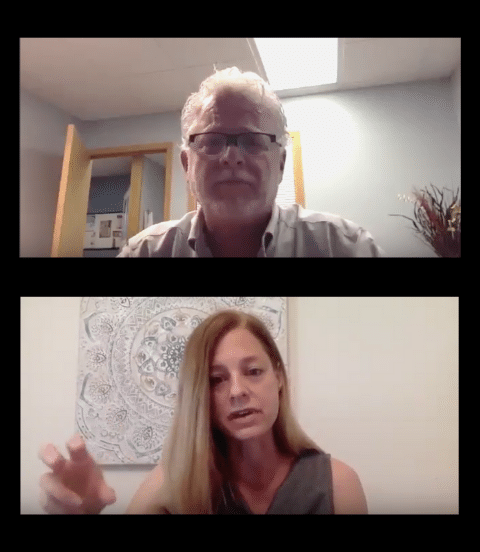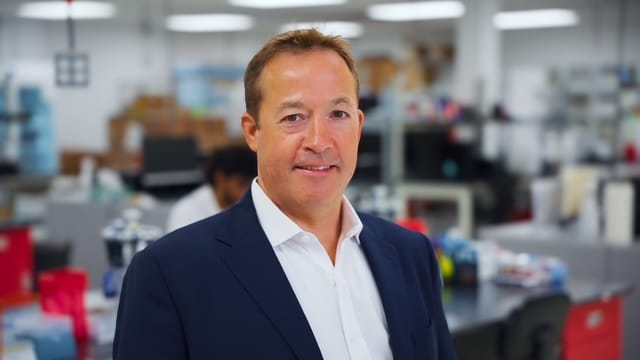The collaborative care model is touted as the future of healthcare, yet too many doctors are still leaving health coaching on the back burner. Dr. Roy Hall says that’s a big mistake, both for doctors and for their patients.
He uses the collaborative care model—where a doctor and a health coach work together to help patients get well and stay well—to work in partnership with health coach and FMCA alum Allison Kelly. And he says he’s never going back.
How did their partnership develop? What can health coaches who want to find an opportunity like this learn from Dr. Hall and Allison’s story? They share the ins and outs of their collaboration below.

Be Brave. Be Curious. Reach Out With a Pitch.
At Mountain Health Functional Medicine, in Billings, Montana, Dr. Hall sees patients for diabetes, arthritis, autoimmune and thyroid issues, hormones, and other conditions. After completing his IFMCP coursework, he hoped to introduce a 3-4 month coaching program for patients making lifestyle changes. So Dr. Hall posted a position on the FMCA Job Board.
That’s where FMCA alum Deborah Cisneros saw an opportunity: she reached out, leveraged her own curiosity to learn more about his needs and gaps, and pitched him her vision for his practice.
“Be brave, and call up the provider and just tell them what added benefit you can give their clinic,” Dr. Hall says. “I would never go back to not having a coach. It just does not make sense to me. When I look back on our first year, I feel kind of sorry for our clients because they missed out.”
One key is to bring a service mindset to the conversation. A good question to ask is, “How can I best serve you in your practice to help you be successful and help your practice thrive?”
As Dr. Hall and Deborah’s conversations progressed and the coaching program design started to come together (more on that below), Deborah spent time researching contracts and then created a template which she and Dr. Hall customized together for their specific needs. The contract outlined coaching roles and responsibilities, communication expectations, and rates. And then they were off!
Deborah was Dr. Hall’s coach for a year before she moved out of the country and referred Allison, whom she knew from her class at FMCA, to take her place. Allison and Dr. Hall have been working together for a year now.
How Their Collaboration Works
- Doctor initiates coaching: Dr. Hall determines that a particular patient would benefit from coaching and refers them to Allison.
- Coach reaches out: Allison, who works remotely from Winston-Salem, North Carolina, reaches out via phone to introduce herself and share what the patient can expect from their coaching experience (average time in coaching is about 6 months, but ranges from 3-12 months).
- Intake: Allison uses the Healthie platform to send the patient their coaching agreement, authorization to release records, HIPAA agreement, and a few tools like the VIA Character Strength Survey.
- Foundation session: During the first coaching session, which lasts about an hour, Allison and her new patient discuss expectations, the patient’s hopes and goals for coaching, any initial lifestyle changes like an elimination food plan, and any questions they have.
- “I get an idea of their readiness to change, and then we navigate through the program together,” says Allison. “I’ll work with them on very specific goals, whether that’s related to movement, hydration, stress or sleep, etc.”
- Follow-up sessions and check-ins: Allison sees each patient for 30-minute follow-up sessions every 2-3 weeks, while they meet with Dr. Hall every 3 weeks. She’s sure to check in via text often, to make sure they feel supported and are on the right track.
- Completion: Each patient’s journey is a little different, and the end of the coaching program is determined by Dr. Hall, Allison, and the individual patient at a time appropriate to their unique situation.
- Payment: Clients pay Dr. Hall a lump sum for their entire treatment package, which includes coaching. Allison then invoices the doctor once per month using QuickBooks.
“Intuitively, I always knew that lifestyle change is possible. I even knew that reversing chronic disease was possible. But to see it in action has just been really, really inspiring for me.“
Allison Kelly, Mountain Health Functional Medicine
Good Communication = Strong Collaboration
Though they’re 2000 miles apart, Dr. Hall and Allison are in close communication thanks to the Electronic Health Records (EHR) they use to collaborate on each patient’s treatment.
After Dr. Hall sees a patient, he adds his notes to their EHR along with IFM completed forms and any lab results. Allison then reviews the information and can add her own notes throughout the course of treatment.
They communicate seamlessly through EHR, leaving notes, observations, and suggestions to each other so that they’re always up-to-date. EHR makes it easy to track progress, bounce ideas off one another, and point out things that may have been missed by one person alone.
Coaching time per week:
Allison works about 10-15 hours per week in coaching sessions, updating notes, and following up. She also allows clients to contact her outside of scheduled coaching sessions, “because we know that it’s a challenging process.” Her clients will text her a question or a photo of a food label, and she’s happy to help them out.
“It’s made a tremendous difference. People get well faster.”
Dr. Roy Hall, Mountain Health Functional Medicine
Dr. Hall can’t imagine going back to the “old days” when he didn’t have a health coach. “It’s made a tremendous difference in our practice here. I like it because people get well faster. People do better when I have help versus when I do everything myself!”
Allison agrees. “This has been one of the most amazing experiences … Intuitively, I always knew that lifestyle change is possible. I even knew that reversing chronic disease was possible. But to see it in action has just been really, really inspiring for me.”
And while Allison learns a lot from Dr. Hall, her coach approach is rubbing off on him, too. “Allison teaches me a lot of things,” he notes. “Questions to ask … I’m learning a lot from her and it not only makes my life easier, it’s a good education for me.”
“You’ll Be Amazed At The Weight It Takes Off Your Shoulders”
Dr. Hall’s advice for providers who are thinking about working with a coach: “Try it for three months…You’ll be amazed at the weight it takes off your shoulders.” You don’t have to commit a lifetime to coaching, he says. “Give it three months and I think you’ll be sold.”
Thank you, Allison and Dr. Hall, for sharing this peek behind the curtain of your practice with us! We know your story will inspire health coaches and doctors alike to initiate more collaborative care partnerships that transform patient health.
Our Latest Blogs
-

Would You Be a Good Health Coach?
Read Full Article: Would You Be a Good Health Coach? -

Food Sensitivity Testing 101: Supporting Clients with Inflammation and Gut Issues
Read Full Article: Food Sensitivity Testing 101: Supporting Clients with Inflammation and Gut Issues -

Protein 101: The Health Coach’s Guide
Read Full Article: Protein 101: The Health Coach’s Guide

